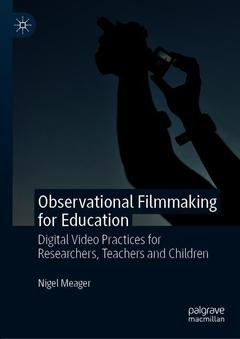Description
Observational Filmmaking for Education, 1st ed. 2019
Digital Video Practices for Researchers, Teachers and Children
Author: Meager Nigel
Language: English
Subjects for Observational Filmmaking for Education:
Approximative price 89.66 €
In Print (Delivery period: 15 days).
Add to cart
Publication date: 03-2019
224 p. · 14.8x21 cm · Hardback
224 p. · 14.8x21 cm · Hardback
Description
/li>Contents
/li>Biography
/li>Comment
/li>
This book places observational filmmaking in the context of the rapidly developing landscape of creativity and arts based research in education. The author uses observational filmmaking as a lens to address debates surrounding video based and arts based research. Utilising the work of Dewey and Deleuze as the theoretical underpinnings of the volume, this is combined with numerous practical examples of observational filmmaking in schools. The author argues that observational video camera and editing techniques combine careful observation with rigorous visual analysis: they place sensory, affectual and aesthetic qualities in experience centre stage. While observational filmmaking in itself has enormous potential as a methodology for education research, it may also become a fulcrum for children?s learning. Children record their experiences in the world around them as they look carefully with a video camera. This pioneering yet practical book will be of interest and value to students and scholars of creativity, learning, and education research methods, as well as constituting a useful guide for teachers, arts practitioners and education policy makers.
Chapter 1. Introduction.- Chapter 2. Observational film and children.- Chapter 3. Experiential empiricism and children's films.- Chapter 4. Academic frames.- Chapter 5. Ethics.- Chapter 6. Camera work and editing for children, teachers and researchers.- Chapter 7. Epilogue.
Nigel Meager is an Associate of King’s College, University of Cambridge, UK.
Shines a light on observational filmmaking in the context of creativity and arts based research
Uses both theory and practical examples from similar previous films
Highlights the potential of observational filmmaking for both education research and children's learning
© 2024 LAVOISIER S.A.S.

